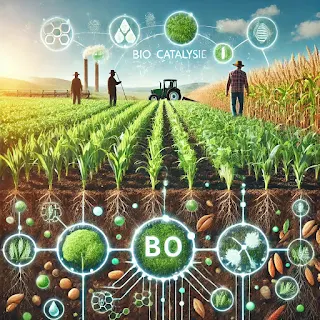As the population of the world grows, so will the demand for sustainable and efficient agriculture in the production of food. Promising areas of innovation include one concerning bio catalysis: the process that uses biological catalysts to speed up chemical reactions, such as bio catalysis to increase the productive capacity of agriculture. Bio catalysis can provide agriculture with dramatic leaps in productivity through healthier soil and better plant growth while promoting less chemical fertilizer use. This blog discusses what bio-catalysis is, how bio-catalysts are produced, their role in agriculture, and what benefits this can bring about to increase agricultural output.
What is Bio Catalysis?
Bio-catalysis is the process involving the application of naturally occurring biological molecules, normally enzymes, in speeding up or even initiating chemical reactions. Enzymes are proteins that function as a catalyst and reduce the activation energy needed for a specific chemical reaction. This way, reactions can be conducted faster and in higher yields. Bio-catalysts can play an important role in agricultural usage-to convert organic materials into usable nutrients, break down harmful substances, or to enhance plant growth.Conventional use of chemical catalysts in the agricultural sector to maximize crop yields and soil fertility provided the sector with nutrients for more than decades. Bio catalysis opened a new face with reinvigorated friendly ways to achieve the same results, if not more effective, without causing as many adverse effects on the environment.
How are Bio Catalysts Made?
Bio catalysts are produced using enzymes sourced from plants, animals, or microorganisms, with these enzymes either being harvested naturally or created through biotechnology, such as recombinant DNA technology. This process allows for the genetic modification of microorganisms to produce specific enzymes designed for agricultural purposes, such as breaking down plant matter or converting nutrients into forms that crops can easily absorb. The production of bio catalysts involves several key steps: isolating the necessary enzymes from natural sources, using genetic engineering to enhance enzyme production if needed, purifying the enzymes to remove impurities, and formulating them into usable agricultural products, such as soil amendments, seed treatments, or sprays.
What is the use of bio catalyst in agricultural farms?
Bio catalysts accelerate biochemical reactions that are essential for promoting plant health and improving nutrient use in agriculture. They perform various functions such as breaking down organic matter like crop residues into simpler compounds, making it easier for plants to absorb nutrients. Additionally, bio catalysts improve nutrient uptake by converting them into bioavailable forms, while also stimulating plant growth by interacting with plant hormones. Furthermore, they enhance soil health by facilitating nutrient cycling and organic matter decomposition. These actions contribute to healthier plants, higher yields, and a more sustainable agricultural ecosystem.Features and Benefits of Bio Catalysts
The use of bio catalysts in agriculture provides several key features and benefits over traditional chemical methods. Bio catalysts are eco-friendly, being biodegradable and non-toxic, making them a sustainable alternative to synthetic fertilizers and pesticides. They improve soil health by enhancing natural biochemical processes, resulting in better soil fertility, structure, and water retention. This reduces the need for chemical inputs, minimizing risks like chemical runoff and soil degradation. Additionally, bio catalysts promote more efficient nutrient uptake, increase crop yields, and help plants become more resilient to stresses like drought and pests. Finally, they enhance nutrient cycling by speeding up the breakdown of organic matter, leading to healthier crops and more sustainable farming practices.Will Bio Catalysts Improve Soil Fertility and Agricultural Output?
Bio catalysts are said to increase both soil fertility and agricultural output. Availability of the critical nutrients, soil structure, and presence of beneficial microorganisms are what define soil fertility. Bio catalysts hasten natural processes, for example, decomposition of organic matter and cycling of nutrients, thereby making nutrients available in a plant-usable form. This means more root growth and healthier plants, leading to increased crop yields.
How Bio Catalysts Enhance Soil Fertility?
Bio catalysts play a major role in soil fertility. They stimulate several prime processes in the soil which enhance accessibility of major nutrients in the soil for plants. So, they increase availability through decomposing complex organic compounds and make essential nutrients like nitrogen, phosphorus, and potassium more accessible for plant uptake. Also, bio catalysts stimulate microbial activity, making it more efficient to cycle nutrients because beneficial microbes can decompose this organic matter and leave out nutrients for assimilation by plants. Soil is similarly enhanced by bio-catalysts as they promote formation of aggregates in soil, improving the water retention capacity, and the roots of plants can penetrate further into the soil that allows healthier growth.Impact on Agricultural Output:
Bio catalysts contribute to higher crop yields by enhancing nutrient availability and improving plant resilience, particularly in nutrient-deficient soils. Studies have shown that using bio catalysts can significantly boost productivity, as plants receive more essential nutrients and become more resistant to environmental stressors. Additionally, bio catalysts promote sustainable growth by fostering long-term soil health, unlike synthetic fertilizers that can degrade soil quality over time. This sustainable approach leads to consistently higher yields, supporting more productive and environmentally responsible farming practices.














0 Comments